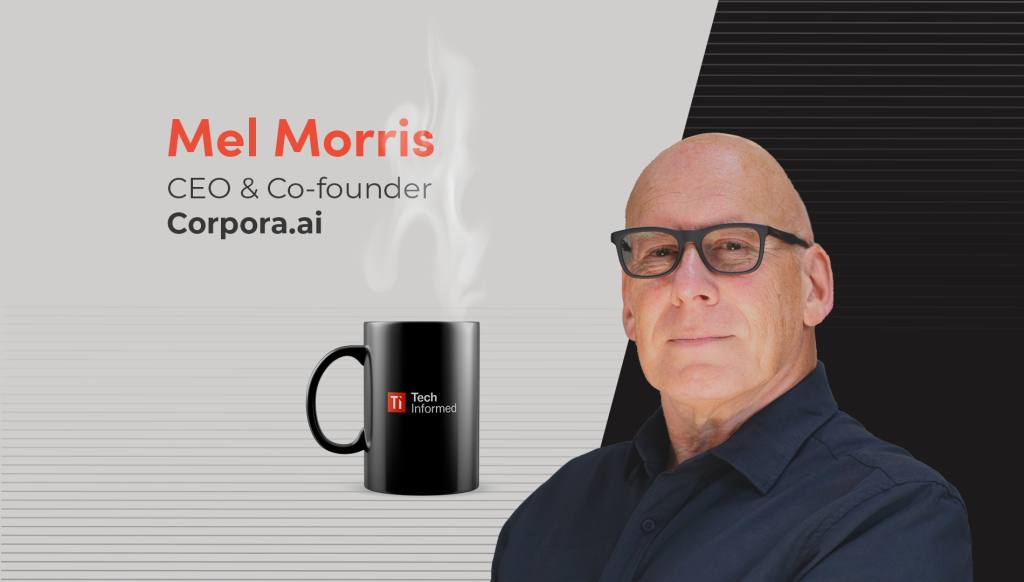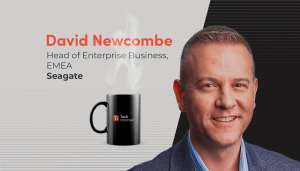

A coffee with…Mel Morris, CEO and co-founder, Corpora.ai
Once an early investor and chair of major mobile gaming company King, known for successes such as Candy Crush, and a founder of an online dating site as early as the 2000s (Udate), Mel Morris’…
Once an early investor and chair of major mobile gaming company King, known for successes such as Candy Crush, and a founder of an online dating site as early as the 2000s (Udate), Mel Morris’ history suggests he has an eye for the next big thing.
Over a brew, Morris shares his views on the future, how to stay ahead, and what he’s working on now: Corpora.ai, an artificial intelligence ‘research engine’ aimed at providing lengthier responses to more complex questions with academics in mind.
We discuss what makes this AI stand out from the rest, what he would do if he launched a dating app in the mid-2020s, and lessons learnt from his tenure owning Derby County Football Club.
How has the tech industry changed since you first started?
I’ve been in tech for nearly six decades, which means constantly starting over. The pace of change has always been fast, but nothing compares to the shift since ChatGPT launched.
I told my team recently: we need to think in two-week cycles now. That’s how quickly the market moves.
What’s kept me going all this time is an obsession with performance and optimisation -whether that’s in cars or code.
I’ve also got a brilliant team of Gen Z developers. They get a bad rap, but they’re fast learners and, with some guidance, develop real depth.
What are you working on at Corpora.ai, and how is it different?
We’re taking a very different approach. Right now, we’re focused on our next version, which I think could dominate a large slice of the market.
Big players like OpenAI, Anthropic and Mistral are pouring money into bigger, more powerful models. But the market for ultra-premium AI is unclear.
We’ve taken a different route: combining AI with advanced data management. Our product is model agnostic. We work with all of them – OpenAI, Anthropic, Mistral, Gemini.
Because of our optimisation layer, we can get better, faster, cheaper results using the least expensive models.
For example, OpenAI’s GPT-4.5 might cost $150 per million tokens. GPT-4o Mini? Just $0.60. With our system, we can match or even beat the output of the expensive models, at a fraction of the cost.
We’ll be launching tools to compete with Perplexity and you.com, but our real value is under the hood. We help companies cut costs and boost speed, without sacrificing quality. That might sound like snake oil, but we plan to demonstrate it in the next couple of months.
In 2000, you launched the online dating site Udate. If you were to launch an online dating app with the technology we have now, what would you do differently?
I’ve always felt there was unfinished business with Udate. After we merged with Match.com, I predicted minimal growth. It didn’t go down well, but I stood by it.
Dating doesn’t scale easily. We made the mistake of showcasing our best-looking users, which raised expectations unrealistically. People usually date at their own “peer level” – in looks, personality, whatever.
If I were building something today, I’d take a free-market economy model. You’d be assigned a number when you join, and you wouldn’t need to know this number, but it would show your profile to people with a similar number.
Say you are assigned a five, you’d be shown to sixes and fours, but if only fours respond to you, that means you are probably a four, so it would adapt, increasing or decreasing the score so people match on a peer level basis.
I know it sounds impersonal, but it mirrors what happens in the real world.
Did you think Candy Crush would be a success when you first got involved?
It took over a decade to really take off. The co-founders had worked with me at Udate and invested in a small Swedish gaming startup.
I helped raise funding, but no VCs were interested. So, I bankrolled it myself and stayed on as chairman through to the IPO.
The key to King’s success wasn’t just the game, it was the business model.
It was another classic example of a great viral marketing method that really worked well. I look back on some of the original methods, like the birthday alert, which was simple but effective.
We moved away from winner-takes-all tournaments to something ongoing and social.
What did you learn from your time at Derby County Football Club?
Sport is nothing like tech, much less predictable. We bought in just before the new Premier League rights kicked in, which gave relegated clubs huge financial advantages.
We tried to push for promotion, but it didn’t work. I was also too stretched, trying to manage seven other businesses at the same time.
The biggest lesson? Don’t do it part-time. In football, your mistakes cost you dearly, like managers fired a month into a three-year contract. That wouldn’t fly in tech.
How do you wind down?
I’ve got six grandchildren who keep me busy and entertained. I also love skiing and Spain. I’m not one for chasing new destinations. I prefer going back to favourites like Courchevel and Val d’Isère.
How do you take your coffee?
I take it any way, really. But if I have a choice, I’ll go for something milky, like a latte or cappuccino. I’m not a fan of the bitter ones.











